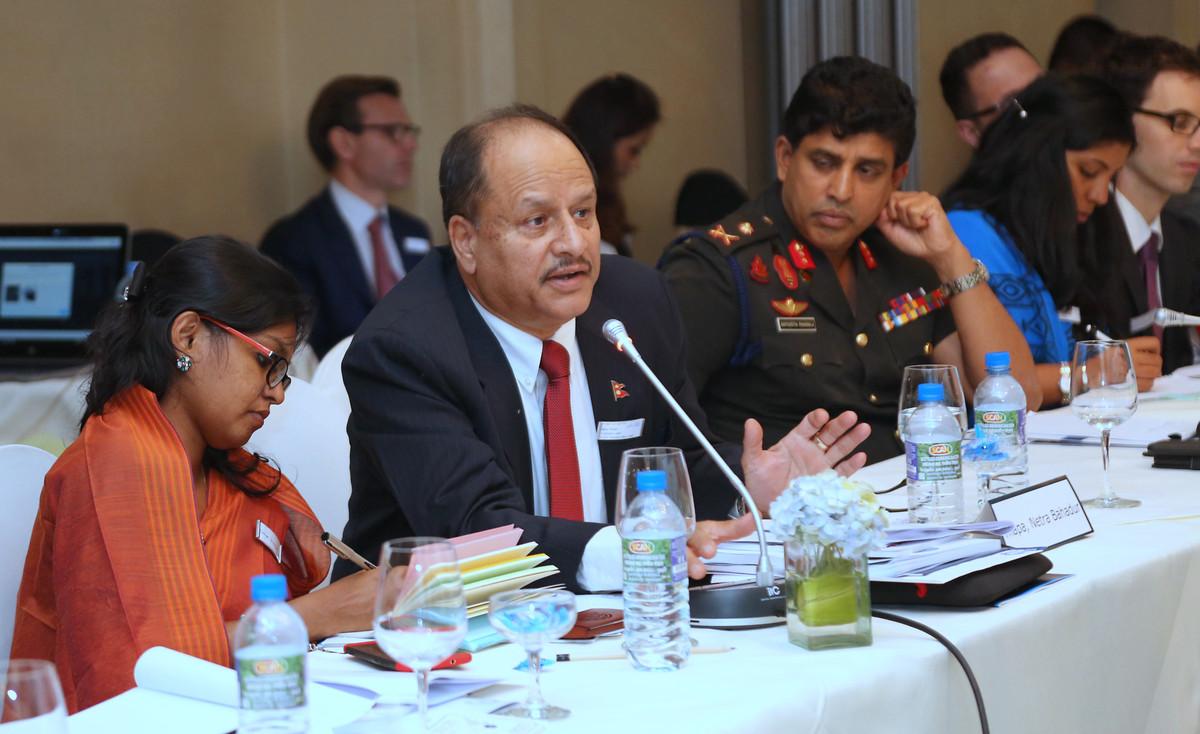Event reports
The event was jointly organised by the Regional Project Energy Security and Climate Change in Asia and Pacific (RECAP) with the Institute of National Security Studies Sri Lanka (INSSSL) and the Centre for South Asian Studies (CSAS) from Nepal, all being members of the KAS-COSATT network. In Colombo, the capital of Sri Lanka, the Secretary to the Ministry of Defence in Sri Lanka, H.E. Kapila Waidyaratne PC, and numerous high-ranking representatives of the armed forces from different South Asian countries seized the opportunity to exchange their knowledge about the impacts of global warming on (non-)traditional security in the region. The participants presented experiences made in their respective field of work. Several (former) ambassadors contributed from a diplomatic point of view. Journalists and representatives from non-governmental organisations represented civil society perspectives.
The workshop commenced with focussing on the current impacts of climate change on South Asia and other regions. The presentations by military and civil representatives showed clearly that the countries are massively affected by global warming in various ways. Whilst Bangladesh and the Maledives are loosing densely populated living space to the rising sea, in Nepal, the increasing melt of snow and glaciers affects the water supply.
The strategies of civil society and politics to cope with these challenges are likewise manifold. For both disaster relief and long-term adaptation to climate change, all countries rely to a significant extent on the military and para-military forces. The participants raised the argument that armed forces are the only institution to dispose extensive resources for a quick and comprehensive logistical and strategic support. The engagement of armed forces is therefore indispensable for an efficient and comprehensive protection of the population in South Asia. Some tasks such as spontaneous evacuations or drainage measurements during floodings can only be conducted by the military.
However, solutions for a sustainable approach to such challenges must deal critically with the existing structure of traditional security in the region. The following presentations therefore shed light on the complex relations between the South Asian countries including the diplomatic tensions and potential military conflicts due to unsolved historical disputes. The South Asian Association for Regional Cooperation (SAARC) is much less integrated than the Southeast Asian ASEAN or security structures in Europe. It is not able to settle the geopolitical disputes stemming from (de-)colonisation, notably between India and Pakistan. The participants argued and regretted that the huge cultural variety and the strong national (and in India also subnational) identities prevent the peoples living between Himalays and Indian Ocean to make full use of the potential to mutual trust and collaboration.
Climate change actually could led to closer cooperation more necessary, but also to increased tensions, i.e. through the shortage of resources. Nepal, India and Bangladesh for instance have quite different opinions concerning the rights of using the limited water of the Ganges river system. South Asia's relations to its neighbouring regions aren't less complex. Especially China is enhancing its influence in the region by economic, diplomatic and military means.
Based on these observations, the participants discussed the future role of armed forces in climate politics. It is less know that basic concepts of contemporary climate science have been developed during the preparation and evaluation of nuclear weapons test. In South Asia, the military intensively uses data and analysis of climate science. This also applies for the US because strategic threats and conditions for military missions are increasingly defined by climate change. On the other hand, the military itself is a significant cause for pollution of atmosphere and land degradation worldwide. Military representatives agreed that the armed forces need to put more emphasis on environment protection when purchasing new equipment and conducting manoeuvres. But they also made clear that the core task is providing security. Sustainable climate protection is and will remain the primary responsibility of civil political decisions.









